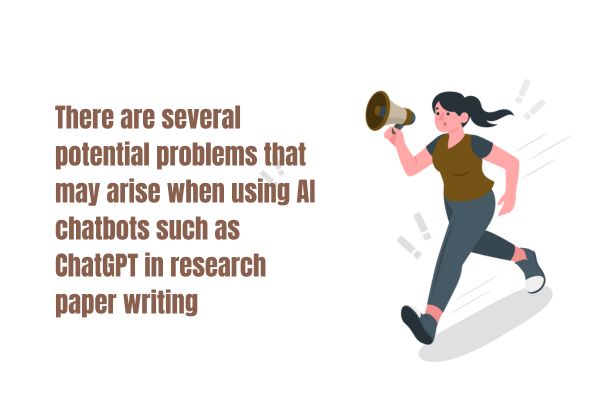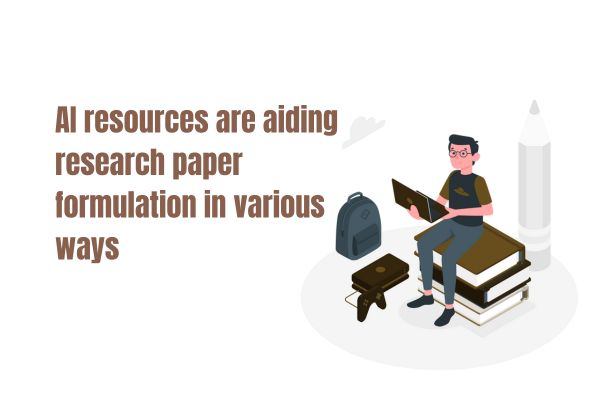
One thing is for sure that chatgpt cannot take the job of the researchers, I hope you know why that is? Then can chatgpt help us to improve our research work or it will just throw water on our work. That’s what we will be finding out in this blog. It is for sure it can help the researchers to improve their skills but how? This also we will describe in this blog. So, let’s begin by knowing a little bit about what research paper writing is and then we will dive deep into the topic.
Research paper writing is the process of conducting research, analysing data, and presenting the findings in writing. It involves identifying a research question or problem, conducting a literature review to gather background information, collecting data and synthesizing the results into a coherent and well-organized written document.
Research paper writing typically involves a systematic and structured approach, using established methodologies and technologies appropriate for the field of study. The aim of research paper writing is to communicate new knowledge or insights that advance understanding in a particular field of study. Research papers can be written for various purposes, including academic publications, conference presentations, and other professional contexts.
Before going into the topic, let us know a little bit about How to write a research paper. It’s basically choosing a topic, conducting research, creating an outline, writing the introduction and the body, and finally writing the conclusion. But what am I saying? Because there’s a difference between writing a research paper and writing an academic research paper. So let’s know How to write an academic research paper.
It’s choosing a research question, and conducting a literature review. developing a hypothesis and so on. But the reason for the difference between them is the academic research paper format which starts from the title page, abstract, and introduction to the reference. So, as we have gathered little pieces of information required for diving deeper into the blog, now we can begin.
Now, first, let us know the usage of chatgpt in the field of research paper writing and then we will navigate the future of research paper writing.
ChatGPT, as an AI-powered writing assistant, can be used in various ways in the field of research paper writing.
Here are some potential ways in which ChatGPT could be used:

Generating ideas and topic suggestions: ChatGPT can be used to generate ideas for research paper topics and provide suggestions for related literature. It can analyze and synthesize information from various sources and provide useful insights and recommendations for further investigation.
Writing assistance and feedback: It can help writers draft their research papers by suggesting sentence structures, grammar, and vocabulary. It can also provide feedback on the clarity and coherence of the text, helping writers refine their ideas and arguments.
Citation and reference management: This AI chatbot can assist writers in managing their citations and references by generating a list of sources and formatting them according to the appropriate style guide.
Language translation: ChatGPT can be used to translate research papers into different languages, making it easier for researchers to share their findings with a global audience.
Streamlining the writing process: It can help researchers save time and streamline their writing process by providing automated summaries of key points and suggesting improvements to the organization and structure of the paper.
So, we have understood the use cases of chatgpt but can it be useful for research paper writing in future? Hence, let us know what can be the possible future of research paper writing using the AI-chatbots like chatgpt.
The future of research paper writing using AI chatbots like ChatGPT is promising.
Here are some potential advancements and benefits that could emerge:
.jpg)
Improved writing efficiency: Chatbots like ChatGPT can help researchers write more efficiently, by providing suggestions and feedback in real time. This can lead to faster, more accurate research paper writing and publishing.
Enhanced accuracy and quality: AI chatbots can help improve the accuracy and quality of research paper writing by reducing the likelihood of errors and providing suggestions for improvement. This can ultimately lead to more impactful research and greater recognition within the academic community.
Increased accessibility: Chatbots can make research paper writing more accessible by helping non-native speakers and those with language barriers to communicate their research more effectively. This can lead to a more diverse and inclusive academic community.
Personalization and customization: Chatgpt can be tailored to the individual researcher's writing style and preferences, providing personalized suggestions and feedback. This can help researchers to write more authentically and in their own voice.
Collaboration and community-building: AI chatbots can facilitate collaboration between researchers, providing a platform for sharing ideas and collaborating on research papers. This can lead to the development of new research ideas and the formation of new research communities.
Hence, the use of AI chatbots like ChatGPT has the potential to transform the research paper writing process, making it more efficient, accurate, and accessible, while also fostering collaboration and community-building within the academic community.
But if everything is perfect with chatgpt, then what will happen to us? For this, let us know the possible problems associated with using AI chatbots such as chatgpt in research paper writing which everyone needs to be aware of.
There are several potential problems that may arise when using AI chatbots such as ChatGPT in research paper writing:

Accuracy and Reliability: While AI chatbots have the ability to generate text quickly and efficiently, the accuracy and reliability of the information provided may be questionable. Chatbots are trained based on pre-existing data and therefore may generate information that is incomplete, biased, or inaccurate.
Limited Vocabulary and Contextual Understanding: ChatGPT have a large vocabulary, but they may not always have the necessary contextual understanding to produce the most appropriate response. This can result in text that is grammatically correct but semantically nonsensical, making it difficult to use in research paper writing.
Lack of Critical Thinking: Chatbots rely on predefined rules and patterns to generate text, and do not have the ability to engage in critical thinking or reasoning. This means that they may not be able to offer nuanced or thoughtful responses to complex research questions.
Plagiarism: AI chatbots may produce text that is similar or identical to existing content, raising concerns about plagiarism. It is important to carefully vet and review any text generated by chatbots to ensure that it is original and properly cited.
Limited Flexibility: Chatbots are designed to operate within a specific framework or set of rules, and may not be able to adapt to unexpected or complex research questions. This can limit their usefulness in research paper writing, particularly for interdisciplinary or innovative topics.
Hence, while AI chatbots like ChatGPT may offer some benefits in research paper writing, it is important to carefully consider their limitations and potential drawbacks before relying on them as a primary source of information or text generation.
But we also need to know how AI resources can help in aiding research paper formulation not only in writing but in analysis and deriving conclusions that can be missed by human intellect.
AI resources are aiding research paper formulation in various ways, including:

Literature review: AI-powered tools can help researchers quickly sift through vast amounts of academic literature to identify relevant studies, key findings, and potential research gaps. By using natural language processing and machine learning algorithms, these tools can extract key concepts, relationships, and patterns from unstructured text, allowing researchers to focus on the most relevant literature.
Data analysis: These types of tools can help researchers analyze complex data sets more efficiently and accurately than manual methods. For example, machine learning algorithms can help researchers identify correlations, patterns, and trends in data that may not be immediately apparent to human analysts. These tools can also help reduce errors and biases in data analysis by automating repetitive tasks and applying consistent analytical methods.
Hypothesis testing: AI-powered tools can help researchers test hypotheses and derive conclusions from data more effectively than traditional statistical methods. For example, machine learning algorithms can help researchers identify predictive models and simulate hypothetical scenarios to test the validity of their hypotheses.
Writing assistance: The tools can help researchers write more clearly and effectively by suggesting improvements to grammar, syntax, and style. These tools can also help researchers organize their ideas and structure their papers more logically, using natural language processing and semantic analysis techniques.
AI resources can assist researchers in formulating research papers by helping them to efficiently identify and analyze relevant literature, derive insights from complex data sets, test hypotheses, and write papers more effectively. By leveraging the capabilities of AI, researchers can save time, reduce errors, and uncover new insights that may have been missed using traditional research methods.
If you have any questions, then you can ask in the comments section so that we can answer your queries.
Thank you for reading this article.
